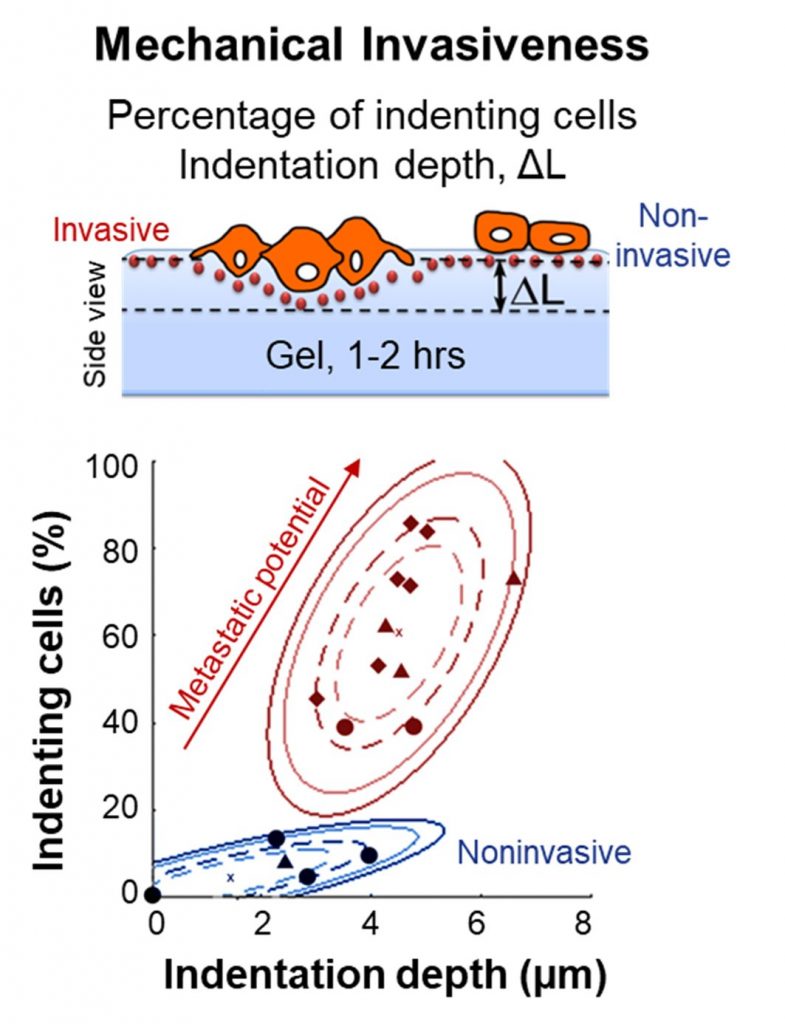Novel technology developed at the Faculty successfully predicts metastatic potential of cancer tumors

Prof. Daphne Weihs of the Faculty of Biomedical Engineering has demonstrated the effectiveness of a new technology in predicting metastatic risk based on tumor samples
Prof. Daphne Weihs, a faculty member at the Faculty of Biomedical Engineering at the Technion, has presented successful results in her study of early and rapid diagnosis of cancer and prediction of metastatic risk. The method is based on original technology Prof. Weihs has developed over the last years. She explains: “The technology I developed will enable medical teams to check, while still in surgery or right after, the likelihood that metastases have formed in other organs. The technology has been tested on tissue samples from actual tumors for the first time, and I hope that the promising results will expedite the translation of this research to clinical practice.”
Cancer is the general name of a group of hundreds of diseases with a common feature – disruption of the control mechanisms of cellular growth and proliferation. Affected cells exhibit uncontrolled and unorganized growth and divide rapidly to create more abnormal cells. Since cancer cells, unlike healthy ones, do not die, the tumor grows fast while pushing and suffocating vital tissues.
A special danger lies in the formation of metastases – secondary tumors that grow in various organs from cancer cells that migrated from the primary tumors through the blood and lymph systems. Because of the difficulty to predict their formation and to detect them in early stages, when treatment is most effective, metastases are the primary cause of death from cancer. Hence the motivation to develop diagnostic tools that will detect them early on and more over – predict their creation.
Prof. Weihs and her research team published their dramatic breakthrough in the scientific journal Annals of Biomedical Engineering. The groundbreaking technology that Prof. Weihs has developed over the last decade has been tested in vitro on cell cultures, but this is the first time it is tested with tumor samples collected from volunteer suspected cancer patients. The research was conducted in collaboration with doctors from Rambam Health Care Campus, and focused on pancreatic cancer – one of the deadliest types of cancer.
The researchers validated the predictions of the new technology against histopathological samples taken from the patients shortly after, and the patient outcomes. The results show that the technology that was developed at the Technion yields credible and reliable predictions as to whether metastases will form in the future, or if they have already spread in the body. The test is quicker compared to current methods – it takes about three hours. One of its greatest advantages is that its efficiency is not dependent on prior genetic and molecular information about the tumor.
The technology provides rapid, quantitative and objective evaluation of the metastatic potential of tumors even in early stages of Cancer. This quantitative early prediction can help doctors select the appropriate treatment and improve survival rates.
The technology developed by Prof. Weihs evaluates the invasiveness on the sampled tumor cells by seeding them on a designated platform made of a synthetic gel that mimics tissue stiffness. On this platform various cell attributes can be examined – their shape, organization and the forces they apply to the gel. Prof. Weihs discovered that cells with higher metastatic potential are stronger – they apply more pressure on the gel until they indent and penetrate it. The larger the number of indenting cells in the sample – the higher the metastatic potential of the tumor.
The new test can be taken on top of standard procedures. Based on the quantitative evaluation of the metastatic potential of the tumor, produced by this method, medical teams will be able to select an especially effective patient-specific treatment, in accordance with the personalized medicine approach.
The current research demonstrated the technology’s effectiveness in breast and pancreatic cancers. Now the method is examined in other types of cancer. Prof. Weihs’ Mechanobiology of Cancer and Wounds Laboratory also develops machine learning techniques that will dramatically improve the precision of the predictions. Soon, Prof. Weihs evaluates, the technology will be able to predict where metastases are likely to be, if they form.
In 2015 Prof. Weihs’ technology received the Medical Ethics Committee’s approval to test her technology on samples collected from cancer patients. The current study is a significant milestone in the important scientific journey of Prof. Weihs. The research was partially funded by the Elias Fund for Medical Research, the Polak Fund for Applied Research, the Ber-Lehmsdorf Foundation and the Gerald O. Mann Charitable Foundation.
Adapted by permission from Springer Nature: Annals of Biomedical Engineering, “Rapid Cancer Diagnosis and Early Prognosis of Metastatic Risk Based on Mechanical Invasiveness of Sampled Cells”, Merkher et al. (2020).
All rights reserved © Faculty of Biomedical Engineering 2026 תחזוקה על ידי Web3d
